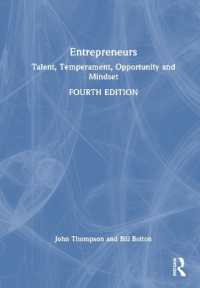- ホーム
- > 洋書
- > 英文書
- > Nature / Ecology
Full Description
The fourth Factor X publication from the German Environment Agency (Umweltbundesamt, UBA), Sustainable Development and Resource Productivity: The Nexus Approaches explores the interdependencies of sustainable development paths and associated resource requirements, describing and analysing the necessities for a more resource efficient world.
The use of and competition for increasingly scarce resources are growing worldwide with current production and consumption patterns of industrialised economies soon to reach the point where the ecosphere will be overtaxed far beyond its limits. Against this background, this volume examines the important initiatives to monitor resource use at the international, EU and national level. The current trends and challenges related to sustainable resource use are discussed, including international challenges for a resource efficient world, megatrends, justice and equitable access to resources. In the second part of the book, contributions examine implementation strategies. They assess the concept known as circular economy and discuss the theory of growth and the role of the financial and education systems. The final section places special emphasis on practical examples. Overall, the book presents concrete ways and examples of achieving more sustainability in practice.
Discussing solutions for a more sustainable use of natural resources, this book is essential reading for scholars and students of natural resources and sustainable development and decision-makers and experts from the fields of policy development, industry and civil society.
The Open Access version of this book, available at https://www.taylorfrancis.com/books/e/9781003000365, has been made available under a Creative Commons Attribution 4.0 International License.
Contents
Part 1. Setting the Scene 1. RESCUE the Anthropocene - Urgent Actions for the Great Transformation 2. The world at the ultimate crossroads: climate change, environmental impacts, population, natural resources sufficiency in the long perspective with integrated models 3. Reporting resource use in Germany 4. The Rise of E-Mobility as a Trade-off between social and ecological benefits and Distributional Injustice: How the socio-technical regime and externalisation prevent a profound transformation of the mobility sector 5. The quest for the holy grail: Can smart cities lead us to sustainability? 6. Sustainable development as the ultimate target of adopting a nexus approach to resources management 7. The water-energy nexus of Brazil's hydropower 8. Education, sustainable development, and resource management Part 2. Core Aspects of an Integrated Resource Policy 9. Systemic analysis of the nexus of greenhouse gas emissions and material use in the energy sector 10. Wrong Memes - Organic Farming and Battery Electric Vehicles 11. What's going on abroad? Monitoring international resource policies 12. Pathways to a Resource-Efficient and Greenhouse-Gas Neutral Germany 13. Resource Use in a Post-fossil Green Germany 14. Vertical integration in a multi-level governance system using the example of the German Resource Efficiency Programme (ProgRess) 15. A strategy to increase the resource efficiency of renewable energy technologies 16. Governing Critical Infrastructure in digital futures 17. The energy transition in Deventer - A Hanseatic approach Part 3. Case Studies of Existing Solutions 18. Natural Resources as Common Goods 19. Sustainable Resource Output: Towards an Approach to a Multidimensional Environmental Assessment of Biomass Production 20. More Resource efficiency in production and products - Digitalisation supports industry and trades 21. 8 Tons of Lifestyle - Monitoring a Sustainable Material Footprint for Households in Germany and the World 22. C like Clever and Cycle - Without a smart and systematic conception of the metal industry, product labelling and an indicator system, nothing will happen 23. The Nexus of Procurement and Sustainability - Reflection of the Limits and Opportunities of Product Labels, Using the Example of Forest Stewardship Council (FSC) 24. The role of biomass use in a defossilised and resource-efficient world Part 4. Pioneering Innovations 25. Big, environmentally friendly events: Sparing resources, respecting nature, setting limits: An attempt by the German Protestant Festival (Deutscher Evangelischer Kirchentag) at organising a big event on a sustainable footing 26. The Kwawu resilient entrepreneurial ecosystems: A complex adaptive systems approach to achieving the Sustainable Development Goals 27. Exploring the possibility of a Meat Tax 28. Facilitating sustainable dietary choices for positive nutritional and environmental outcomes 29. Environmental Systems Innovation in ancient India with Factor X components as revealed in old Tamil Manuscripts






